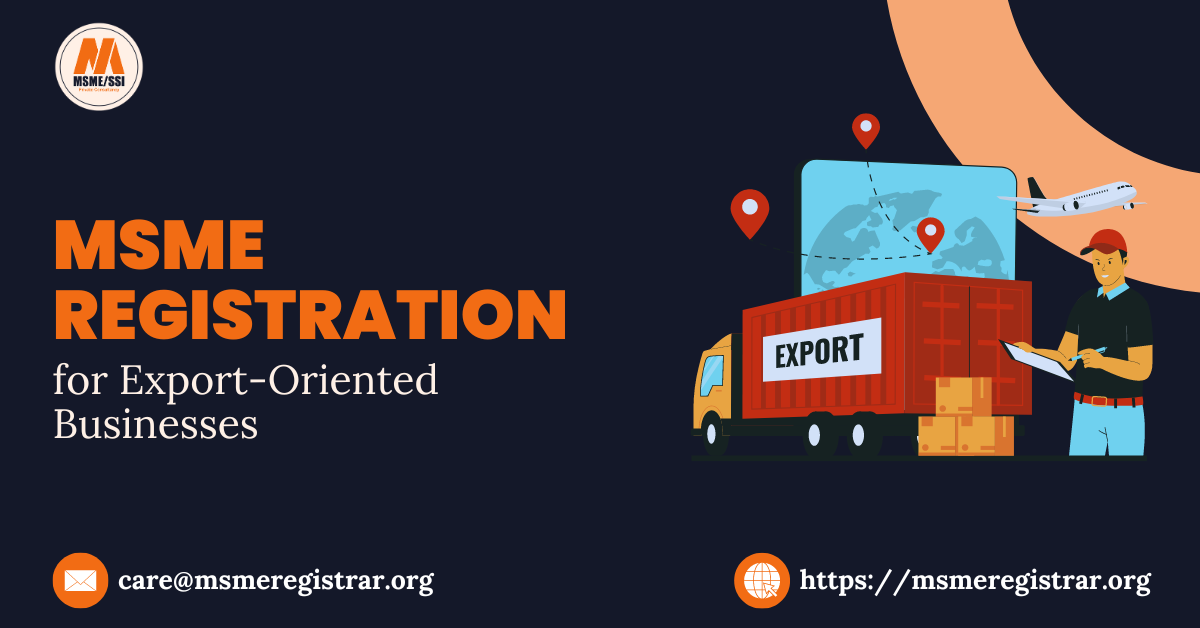Micro, Small, and Medium Enterprises (MSMEs) form the backbone of the Indian economy, contributing significantly to employment, innovation, and economic growth. With globalization opening new avenues for trade, MSMEs are increasingly looking to expand their reach beyond domestic markets. For businesses with an eye on exports, obtaining MSME registration is crucial. This guide explores the process, benefits, and requirements of MSME registration for export-oriented businesses.
Understanding MSME Registration
MSME registration is a government initiative that allows businesses to be recognized as Micro, Small, or Medium Enterprises under the Ministry of Micro, Small, and Medium Enterprises (MSME). This registration provides a range of benefits, including access to subsidies, loans, and various government schemes aimed at promoting and supporting MSMEs.
In the context of export-oriented businesses, MSME registration can provide significant advantages, such as access to international markets, export incentives, and financial assistance to compete globally.
Categories of MSMEs
The classification of MSMEs is based on the investment in plant and machinery or equipment and the annual turnover of the enterprise. As per the revised definition by the Government of India, the classification is as follows:
-
Micro Enterprises: Investment up to ₹1 crore and turnover up to ₹5 crore.
-
Small Enterprises: Investment up to ₹10 crore and turnover up to ₹50 crore.
-
Medium Enterprises: Investment up to ₹50 crore and turnover up to ₹250 crore.
These classifications are crucial for businesses looking to register as MSMEs, as they determine the eligibility for various schemes and benefits.
Steps to Register as an MSME
The process of registering an MSME for export-oriented businesses is straightforward and can be completed online through the Udyam Registration portal. Here’s a step-by-step guide:
-
Step 1:Visit the MSME Registration Portal : (https://msmeregistrar.org)
-
Step 2: Provide Business Details: The portal will require details about the business, including the name of the enterprise, the type of organization, PAN number of the business owner.
-
Step 3: Classify Your Business: Based on the investment and turnover, classify your business as micro, small, or medium.
-
Step 4: Submit the Application: Once all the necessary details are filled in, submit the application online. The registration process does not require any physical documentation and is entirely paperless.
-
Step 5: Pay Application Fee: Pay the minimal application fee to complete your registration successfully.
-
Step 6: Receive the Udyam Registration Certificate: Upon successful submission, you will receive a Udyam Registration Certificate, which serves as proof of your MSME status. This certificate is a vital document for availing of various export-related benefits and schemes.
The Importance of MSME Registration for Export-Oriented Businesses
For businesses involved in exports, MSME registration opens the door to a host of benefits, including:
Access to Export Subsidies and Incentives:
The government offers various subsidies and incentives to promote exports by MSMEs. Registered MSMEs can avail themselves of these benefits, including duty drawback schemes, export promotion capital goods (EPCG) schemes, and financial assistance for participation in international trade fairs.
Priority Sector Lending:
Export-oriented MSMEs are often given priority under the priority sector lending by banks. This ensures that MSMEs have easier access to credit at favourable interest rates, which is essential for scaling operations and meeting international demand.
Technology Upgradation Support:
The government provides support for the technological upgradation of MSMEs through schemes like the Credit Linked Capital Subsidy Scheme (CLCSS). This is particularly beneficial for export-oriented businesses looking to enhance their production capabilities to meet international standards.
Market Development Assistance (MDA):
Registered MSMEs can avail themselves of the Market Development Assistance scheme, which provides financial support for export promotion activities such as participation in trade fairs, buyer-seller meets, and market studies abroad.
Export Promotion Councils:
MSME registration enables businesses to become members of various Export Promotion Councils (EPCs). These councils offer insights, networking opportunities, and support in navigating international markets.
Government Schemes Supporting Export-Oriented MSMEs
Several government schemes are designed specifically to support MSMEs in their export endeavours:
Interest Equalization Scheme (IES):
This scheme provides pre- and post-shipment credit to exporters at subsidized interest rates, making it easier for MSMEs to finance their export operations.
Export Promotion Capital Goods (EPCG) Scheme:
Under this scheme, MSMEs can import capital goods at zero customs duty for production purposes, provided these goods are used to produce export items.
Merchandise Exports from India Scheme (MEIS):
MEIS provides incentives to MSMEs exporting goods from India by offering duty credits that can be used to offset import duties.
Niryat Bandhu Scheme:
This scheme provides mentorship and support to first-time exporters, helping MSMEs understand the intricacies of international trade.
Note: Apply for MSME Re-registration through the official portal.
Conclusion
MSME registration is not just a regulatory requirement but a gateway to numerous opportunities for export-oriented businesses. With the right approach and strategic use of government support, MSMEs can expand their horizons, access new markets, and contribute to the global economy. By understanding the benefits, challenges, and strategies involved in MSME registration, businesses can position themselves for success in the competitive world of international trade.




